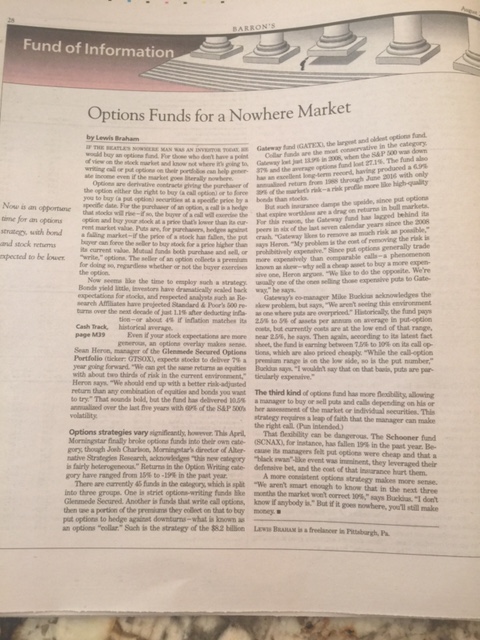With the doomsayers issuing dire warnings about stocks as of late, alternative investments have become the hot topic of conversation in 2016.
For prime examples, you need look no further than Barron’s Weekly, which ran an intriguing feature in its August 29th issue entitled “Options Funds for a Nowhere Market.” (In its online version, Barron’s retitled the piece “Why an Options Fund is a Good Idea Now.”)

At first read, Lewis Braham seems to have created an excellent article on the wisdom of diversifying into options funds.
He makes some great arguments for doing so. These include:
- Respected analysist such as Research Affiliates have projected annual S&P 500 returns over the next decade to average just 1.1% after inflation.
- Writing call or put options in a portfolio can help generate income, even if the market goes nowhere
- Even if your stock expectations are more generous, an options overlay makes sense.
- Because of the growing popularity of options funds, Morningstar has finally broke options funds into their own category
This is from Barron’s, guys – not some online guru trying to peddle a course.
————————————————————————————————————————————–
The media is finally catching on to what a growing chorus of mainstream investors already know: Selling options can be a solid path to creating wealth – regardless of how the underlying market performs.
—————————————————————————————————————————————
I read this piece nodding my head. The media is finally catching on to what a growing chorus of mainstream investors already know: Selling options can be a solid path to creating wealth – regardless of how the underlying market performs.
And as we head towards 2017 the strategy is becoming more institutionalized. Morningstar currently lists 45 funds under the category of “options funds.”
This is solid information and I applaud Mr. Braham and Barron’s for starting to shine more light on this rapidly expanding segment of the investment field.
But there is one glaring omission in the piece. While Mr. Braham touts the value of including options funds to enhance performance in flat markets – he fails to mention a diversification aspect.
There is a reason for that.
There is no diversification.
You see, the strategies and funds this piece explores are certainly attractive and worth pointing out to the non-initiated. But they are all strategies incorporating STOCK options. If you buy into one of these funds, you may indeed be able to target higher returns in a flat stock market. But you are still in the stock market. You may be diversified from outright shares – but you’re still in the same asset class. Your portfolio will still be affected by everything that effects stock prices – earnings, daily geo political news and as discussed earlier, Janet Yellen and the whims of the Federal Reserve. That’s not really diversification.
The Magic of Non-Correlation
Is it possible to enjoy the potential fruits of selling options – but in an asset class completely uncorrelated to equities? If you’re a subscriber to this newsletter – you know the answer is yes.
Barron’s has not caught on to this part yet – which is quite alright for you and me. Commodities tend to get second billing in mainstream financial publications – mainly because most of its readers (and writers) are interested in Stocks. It’s all they’ve ever known.
But commodities options offer option sellers the ability to apply their strategy to a completely uncorrelated asset class. This can provide a valuable diversification component to any portfolio – but especially for higher net worth investors.
But there is a second reason – one that clearly works to your advantage.
Elephants Not Welcome
Paul Meister recently attended a dinner party hosted by Worth magazine at the Rural Society restaurant in Parrilla, Argentina. What does this have to do with you? Mr. Meister is vice chairman of GCM Gorvenor, a $48 billion global asset management firm. That’s with a “B.”
For an elephant like this to move through the markets, he needs ocean sized volume in the assets he trades. Options offer a smaller universe of open contracts. However, in stocks, even if one limits himself to S&P 500 stocks, there are 500 potential stocks on which to sell options. This doesn’t even count shares outside of the S&P or options on indexes. That gives wide enough birth for behemoths like Meister, Icahn or even Buffet to engage.
Icahn the icon. Do you really have an advantage over guys like this?
But in commodities (futures), there are only about 15-20 markets with enough volume to effectively write options on a larger scale. And that includes financial markets like the S&P 500 futures and T-Bonds. While their individual volumes of options are typically much deeper than the average stock (options on major markets such as oil, gold or soybeans is huge), there are not 500-1000 different markets from which to choose.
In short, there is simply not enough room in the commodities options markets for big funds such as this to operate. In addition, commodities – especially the physical commodities such as corn, gasoline or coffee, are typically specialized fields, outside the expertise of most stock analysts.
—————————————————————————————————————————-
You can get the diversification that they can’t. But you can also get it without having to compete with multi-billion dollar fund managers.
—————————————————————————————————————————–
This means less competition for you as a commodity option seller. Commodities options are the domain of individual specialized traders or targeted, boutique funds or managers – able to move in and out of positions nimbly and adjust to changing conditions quickly.
Goliaths like Meister typically cannot do that on a scale big enough to make it worth their while. Which is why you, or a specialized portfolio manager, has an advantage here. You can get the diversification that they can’t. But you can also get it without having to compete with multi-billion dollar fund managers.
Barron’s got it right on the first part and should be applauded for finally starting to give its readers more exposure to options alternatives. The next step will be to introduce its readers to a more diversified options playing field.
James Cordier is head portfolio manager of OptionSellers.com, a global wealth management firm specializing exclusively in option writing portfolios for high net worth investors. He is author of McGraw-Hill’s The Complete Guide to Option Selling, 1st, 2nd and 3rd editions. For more information on James, his firm or portfolios, visit www.OptionSellers.com.




